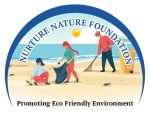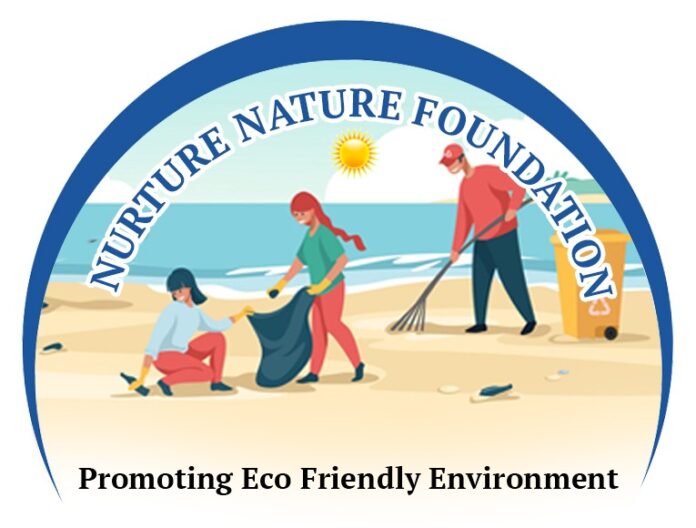By Nurture Nature Foundation (NNF)
Cocoa has long been Ghana’s pride. From the lush green plantations of Ashanti to the rolling farmlands of the Western and Eastern Regions, cocoa is woven into the fabric of Ghana’s identity. It has sustained families for generations, built schools and hospitals, and placed Ghana firmly on the global map as the world’s second-largest producer. In 2024, Ghana exported an impressive 700,000 metric tonnes of cocoa, a figure that filled farmers with pride and brought in vital revenue for the national economy. Cocoa remains more than a crop; it is a symbol of endurance, resilience, and global recognition.
Yet, alongside this story of heritage and hope lies another reality—one far less celebrated but even more staggering in scale. In the very same year, Ghana generated 840,000 metric tonnes of plastic waste, surpassing the weight of cocoa exported. This stark comparison is sobering: Ghana produces more waste in plastic waste than it exports in its most valuable agricultural commodity. The figures lay bare a truth that is as urgent as it is uncomfortable—while cocoa builds our economy, plastic waste is silently undermining our environment, our health, and our future.
The sight is everywhere. In Accra, gutters overflow with discarded sachet water bags and bottles, clogging drainage systems and causing devastating floods during the rainy season. Along the beaches of Jamestown, Chorkor, and Ada, piles of plastic wash ashore with every tide, threatening fishing livelihoods and scaring off tourists. Lagoons like Korle and Keta have become receptacles of waste, where plastics suffocate aquatic life and release toxins into the water. In markets, streets, and homes, plastics accumulate with little to no organized system of collection or recycling. Instead of being seen as a resource, plastics are treated as an endless nuisance.
This paradox—cocoa revered, plastic ignored—calls for a fundamental rethinking of how Ghana approaches its future economy. If cocoa has been the backbone of Ghana’s past and present, could plastics, through innovation and transformation, become part of its future? Could Ghana build a Waste-to-Wealth National Economy that treats the 840,000 metric tonnes of plastic not as garbage to be discarded but as raw material to be harvested, processed, and profited from?
For too long, the narrative around plastic waste has been one of despair. We speak of flooding in Accra, cholera outbreaks linked to poor sanitation, and fishing nets filled with plastic instead of fish. These are not exaggerations; they are lived realities. The economic costs are enormous. Every year, Ghana spends millions cleaning drains and repairing infrastructure damaged by floods caused by clogged waterways. Tourism, one of the most promising industries, suffers as visitors, confronted by dirty beaches, take their money elsewhere. Public health is compromised, with diseases spreading faster in communities where waste festers. Even our food security is at risk, as microplastics enter the food chain through fish and other marine life.
But what if this crisis could be turned into an opportunity? Around the world, nations have shown that plastics can be transformed into valuable products: fuel, pavement blocks, roofing tiles, textiles, furniture, and even art. Recycling industries in countries like South Africa, Rwanda, and Germany have not only reduced pollution but also created jobs, boosted exports, and inspired innovation. Ghana, with its abundance of raw material in the form of waste and its youthful workforce, is in a prime position to do the same. What is lacking is not potential but vision, investment, and leadership.
“It is shocking but true that Ghana produces more plastic waste annually than it exports in cocoa, our national pride. This should shake us into action. We cannot allow 840,000 metric tonnes of waste to poison our drains, kill our fish, and bury our beaches when it could be turned into wealth. We need a new national vision—one that treats waste not as garbage but as gold. Waste-to-wealth must be a central pillar of Ghana’s economic agenda. Imagine if we invested the same seriousness in plastics as we do in cocoa: building collection systems, creating value chains, exporting recycled products, and employing thousands of young people. We could create a new economy while saving our environment. The challenge is not technology—it already exists. The challenge is leadership, coordination, and investment. Ghana must act now. Waste-to-wealth is not an option; it is a necessity.” Peter Asiedu, Executive Director of Nurture Nature Foundation (NNF).
His words reflect not only frustration but possibility. If Ghana can organize its cocoa industry with systems of collection, aggregation, export, and branding, why can’t it do the same for plastics? Imagine a network of plastic collection centers across the country, where households and businesses are incentivized to return their waste. Imagine recycling factories in Accra, Kumasi, and Takoradi turning plastics into pellets for export or into finished products for local use. Imagine thousands of jobs for young people who today struggle with unemployment, now employed in a vibrant recycling economy. Imagine Ghana rebranding itself not only as the land of cocoa but as a leader in environmental innovation in Africa.
The concept of waste-to-wealth is not abstract. Already, small entrepreneurs and startups in Ghana are proving it is possible. Companies are transforming plastics into pavement blocks that withstand floods, into furniture that decorates homes, and into textiles that supply local markets. These pioneering businesses, however, remain under-supported, struggling to scale because national policy has not yet embraced waste as an economic resource. What they need is an enabling environment: financing, technology transfer, and government-backed incentives that treat them as national assets.
The private sector has a major role to play. Just as beverage companies profit from plastics, they must take responsibility for collecting and recycling them. Extended Producer Responsibility (EPR) schemes, common in other countries, could ensure that producers contribute to the costs of managing the waste they generate. Foreign investors could be attracted to Ghana’s recycling potential, bringing technology and capital. Local entrepreneurs could be given tax breaks or grants to innovate. And communities could be mobilized with small stipends to participate in organized collection, turning environmental protection into a dignified source of income.
Beyond economics, the moral case is clear. Waste-to-wealth is not only about profit but about dignity, pride, and sustainability. Children deserve to grow up in communities where drains are clear, beaches are clean, and the air is free from burning plastics. Fisherfolk deserve to cast their nets without fear of pulling in waste instead of fish. Tourists deserve to enjoy Ghana’s coastlines without being confronted by pollution. And future generations deserve a nation that does not suffocate under its own neglect.
Ghana stands at a crossroads. On one path lies continued neglect: clogged drains, deadly floods, polluted lagoons, declining tourism, poisoned fish, and mounting economic costs. On the other path lies transformation: a circular economy where plastics are collected, recycled, and exported; where waste creates wealth, jobs, and pride; where Ghana not only solves its sanitation crisis but also builds a new pillar of economic growth. The statistics are clear: 700,000 metric tonnes of cocoa exported, 840,000 metric tonnes of plastic wasted. The challenge is whether Ghana will allow waste to remain a burden or turn it into an opportunity.
The Nurture Nature Foundation calls on the government to act decisively. A National Waste-to-Wealth Policy must be created, backed by funding, legislation, and institutional coordination. Recycling plants must be built and scaled. Local assemblies must be resourced to enforce waste management. Communities must be empowered to participate. The private sector must be incentivized, and civil society must be embraced as a partner. The vision must be bold: to make Ghana not only a leader in cocoa but a pioneer in waste-to-wealth innovation in Africa.
Cocoa built Ghana’s reputation in the 20th century. Waste could build Ghana’s future in the 21st century. But only if we act now.

